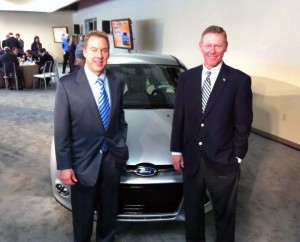
Ford has to maintain the pace of change, says Chairman Bill Ford, left, shown with CEO Alan Mulally, in front of the new 2012 Ford Focus.
Few automakers have gone through more substantial change, in recent years, than Ford Motor Co., and it is paying off with increased sales, margins and profits. But could that actually be the automaker’s undoing?
Success is a two-edged sword, acknowledged Ford’s top executives, including Chairman Bill Ford, in a series of conversations with TheDetroitBureau.com, and if the company rests on its laurels, they believe, it could once again wind up in the precarious position it found itself going into the recession.
Ford’s turnaround has been costly and difficult. It required the closing of a number of plants, the sale of foreign-based brands like Jaguar and Volvo, the closing of the Mercury division, and the piling on of debt. But by avoiding a federal bailout last year, Ford has scored with consumers who applaud its self-determination and reward the maker with their business, said Chairman Ford.
In times past, he quickly adds, the automaker might have smugly settled into a business-as-usual mode.
“In the past, whenever we’ve made it out of the bad times, we’ve stopped changing,” and that, acknowledges Ford, is how it has repeatedly gotten into trouble.
“The world around us continues to change,” stresses the great-grandson of company founder Henry Ford. “We need to recognize this isn’t a static world and find ways to continue driving change through the organization,” even when the crisis is over.
The challenge is finding a balance. The company doesn’t want to go back to the dark days, just a few years ago, when it couldn’t even afford giving employees new business cards when they got a promotion. Today, you can get those cards, and the rest of your stationary, but even the most urgent bill of $1,000 or more must go before Mark Fields, Ford’s President of the Americas, for approval.
Indeed, the effort to maintain the pace of change starts at the top, notes Alan Mulally, Ford’s CEO. When he joined the company, four years ago, he began a series of Thursday meetings during which a mix of top executives and other managers gather to discuss the state of Ford’s business.
In years past, it was rare that problems came up during those meetings. The political pressure, recalls Mulally, was to protect yourself by not revealing failures. All that ended, one morning, when a frustrated Mulally asked why he was about to announce a $20 billion loss if everything was going so well. At a subsequent session, Ford President Fields opened up about a problem with the launch of the then-new Ford Edge. There was silence, for a moment, until Mulally began to applaud.
Today, it’s common for problems to be discussed – and resolved – at these Thursday sessions, insiders reveal.
The payoff can be seen in a variety of ways, Ford officials contend; among other things through better products that suffer from fewer quality problems and yield better margins. Profits, in turn, have also been enhanced by the switch to a global product development process, dubbed One Ford.
That helped Ford justify the 2012 update of the company’s compact Focus model, which went into production, this week, at Ford’ newly-updated Wayne Assembly Plant, outside Detroit. In the past, small products like Focus and the even tinier Fiesta “couldn’t make money for us,” noted Mulally.
But while the new Focus might not generate the same huge profit margins of the truck models Ford used to build at Wayne, “We can make money on them, now,” Mulally insisted, by sharing the underlying “architecture” and a significant share of components between 10 products that will eventually be based off Ford’s Global C-Car platform.
The good news, insisted Chairman Ford, is that consumers are responding positively to the changes at Ford.
On a broad scale, he suggested, “There’s a general recognition, in this country, of the importance of manufacturing.” And buyers are paying more attention to successful domestic companies, like Ford.
That said, Ford acknowledged, “You have to win them back one by one, and some are long gone,” because of problems they might have experienced with Ford Motor Co. products in the past. “But many of those for whom Ford has been off the radar screen a long time are taking another look.”
